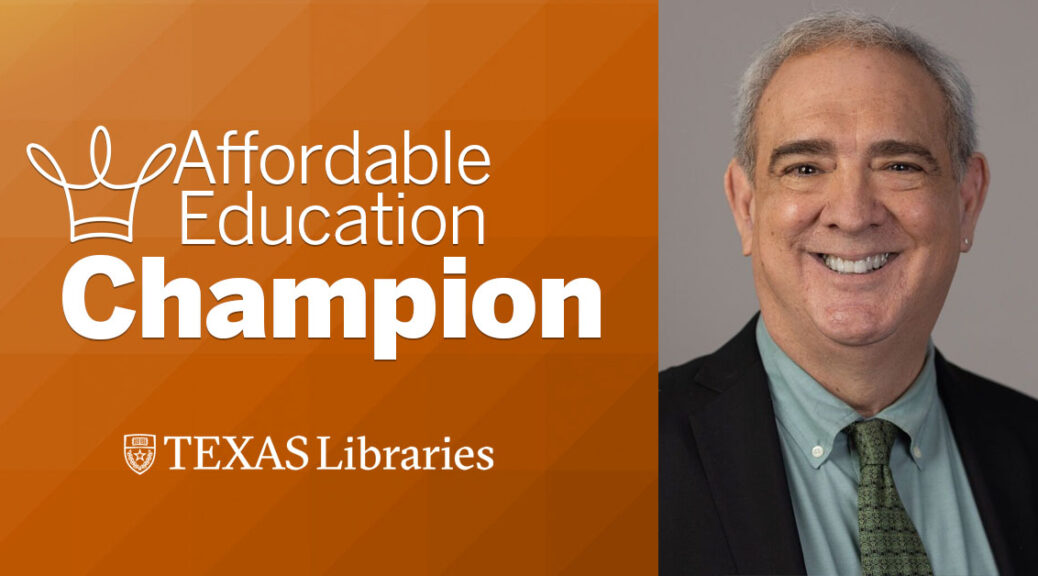In celebration of Open Education Week 2023, the Senate of College Councils, the Natural Sciences Council, and UT Libraries partnered to solicit nominations from students across campus to recognize instructors who increased access and equity by selecting free or low cost course materials for their classes. We’ll be recognizing a few of those nominees this week as Affordable Education Champions!
Affordable Education Champions are instructors who assign free or low cost resources — like textbooks, websites, films, and more — for their courses. Sometimes they author their own materials, and sometimes they’re able to reuse free or low cost work created by others. We celebrate their commitment to fostering access to high quality education at the lowest possible cost barrier for their students.
Today, we recognize and thank Thomas Jesús Garza, who was nominated as an Affordable Education Champion for E 316N, World Literature.
“Thomas Jesús Garza is University Distinguished Teaching Associate Professor in the Department of Slavic and Eurasian Studies and Founding Director of the Texas Language Center. He teaches Russian language and literature, language pedagogy, and contemporary Russian culture. He has been traveling to and researching in Russia since 1979 and has lived in Moscow for over six years. A native Texan, Dr. Garza received his doctorate from Harvard University in 1987. During his more than 30 years at the University, he has received numerous prizes for undergraduate and graduate teaching, including the Texas Excellence Award, the President’s Associates Award, the Harry Ransom Award, was inducted into the University Academy of Distinguished Teachers in 2003, selected for a Regents Outstanding Teaching Award in 2009, and chosen a “Texas Top Ten” instructor by the Texas Exes in 2018. He recently completed a book manuscript on filmic portraits of machismo in contemporary Russian and Mexican cultures and is currently working on a new project on Russian actor and bard, Vladimir Vysotsky in the Americas in the 1970s.”
“No student should ever have to make the choice between buying course books or eating lunch.”
Like many of the other Affordable Education Champions, Dr. Garza recognizes the role accessibility to textbooks plays in promoting equity among the student body. He writes, “The issues of equity and access to a quality higher education are extremely important to me. As [a first generation college student] myself, I understand how challenging undertaking college courses can be, especially when that difficulty is compounded by the excessive cost of books and course materials.” When students don’t have to worry about how they will manage to pay for expensive textbooks, they can focus more fully on the class content. The student nominator for Dr. Garza mentioned that they used the money they saved by not having to purchase textbooks for this particular class to pay for needed medication. This exemplifies the difficult financial decisions some UT students have to make. As Dr. Garza says, “No student should ever have to make the choice between buying course books or eating lunch.”
Furthermore, the student nominator appreciated that the format chosen by Dr. Garza (PDFs uploaded to the class Canvas page) allowed them to go back later to read or reread texts when they had more time to fully appreciate their nuances. They wrote that they planned to return to the texts in the future because of the quality of the discussions held in class and that “[it] made me feel cared for because he understands that we already spend so much money on courses and their materials and that there are ways of accessing wonderful literature without putting any burden on the students. Since a lot of them were in pdf form, I still have the ability to go back and read the ones I loved or save them for when I have time.” Using free materials in courses is a way of approaching teaching in a holistic manner. Students are balancing many responsibilities. Giving them flexibility for how they access texts allows them to engage with the material in the way that works best for them.
Dr. Garza’s class addresses trauma and healing, and the diversity of the readings reflects the many different ways to approach this complex topic. Nevertheless, he was “pleasantly surprised” to discover that many of the texts he wanted to use were already available in digital formats that he could link to in Canvas.
If you are a faculty member who would like to discuss finding and using OER and other free or low cost course materials in your class(es), please contact Heather Walter, Tocker Open Education Librarian (heather.walter@austin.utexas.edu).

